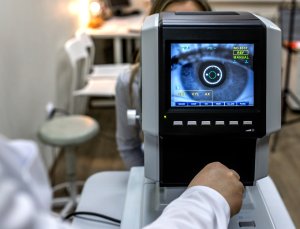Cataract Surgeons in Sinking Spring, PA

Voted Best of Berks—
eight years in a row!
Did you know that cataracts affect 30 million Americans? If you are one of them, you may have noticed vision changes and difficulty driving at night, reading or watching television or movies. Maybe you have even had trouble recognizing faces. If these symptoms sound familiar, Sinking Springs PA residents can see the cataract surgeons at Eye Consultants of Pennsylvania’s Berks County offices in Wyomissing or Blandon, PA.
Cataract Symptoms
Blurred vision, glare, and difficulty reading are all early signs of cataracts, which affect people as they age. Cataracts are diagnosed during a regular eye exam with a special cataract exam, and the surgeon will recommend surgery based on the amount of difficulty you are having with the above-described tasks.
When a person has a cataract, the normally clear lens of the eye becomes cloudy as natural proteins break down and clump onto the lens. These clumps cause light to scatter rather than focus on the retina, located in the back of the eye, so vision is distorted.
Cataracts usually form very gradually, but by age 75, many people have significant vision issues and thus require surgery. Cataracts can develop in one or both eyes and are a very common condition because they form as a natural part of aging.
Cataract Detection
Cataracts progress slowly over many years and are usually not an issue. Surgery is the only remedy and is suggested when everyday activities are significantly impacted. Cataracts are not painful so people often do not even realize cataracts have started forming. Regular eye exams are the only way to detect a cataract, and if you are over age 60, we recommend exams twice per year. Not only can we screen for cataracts, but our excellent eye care professionals can look for other diseases like glaucoma and macular degeneration.
During a cataract exam, we look for lens opacification using specialized viewing instruments. These tests are designed to determine how much a cataract may be affecting vision. Tests include a test of visual acuity, color vision, ability to contrast images and a glare test to determine light sensitivity. The team will also perform a thorough structural examination of the eye.
Cataract Treatment
Since most cataracts develop slowly, most patients don’t even notice the cataract until it is fairly advanced. Surgery is not required until there is significant loss of visual function, but surgery is the only treatment for a cataract. Every patient is different; cataracts develop more rapidly in some patients due to genetics, lifestyle factors like whether you are a smoker, and are also dependent on the types of medications you take.
Some cataracts never progress to the point of requiring surgery, while other patients develop dense cataracts that require surgical treatment. Through regular eye exams, our doctors can track y our cataract progression and recommend surgery, if needed at all, at the appropriate time. We can tell you how much of your vision is impacted and the vision recovery you can expect after surgery.
Visual loss just due to a cataract can be fully restored. If you have nearsightedness, farsightedness or astigmatism in addition to the cataract, we can implant a vision-correcting intraocular lens.
Just remember that cataracts are gradual and typically have no early warning signs. Eye Consultants of Pennsylvania are ready to perform your vision exam, the only way to truly detect and monitor a cataract. If you are in Sinking Spring, come see our cataract surgeons in Wyomissing or Blandon, PA. We cannot stress enough the importance of regular eye exams if you are over age 60. If it has been a while since your last exam or if you are experiencing cataract symptoms, come see us at Eye Consultants of Pennsylvania.
Find a Doctor
Physician information including education, training, practice location and more.
Schedule an Appointment
Call 800-762-7132 or make an appointment online.





